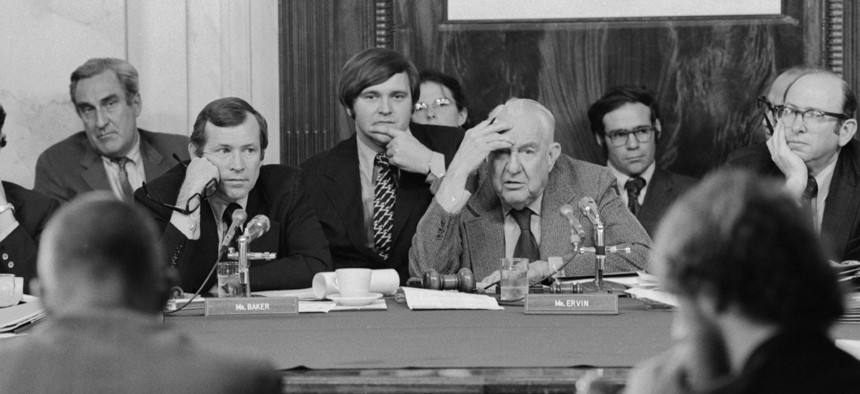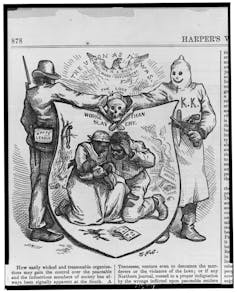
Chairman of the Senate Watergate Committee Sam Ervin sits with Chief Counsel Sam Dash, Sen. Howard Baker, staffer Rufus Edmiston and others as they listen to a witness during the Watergate hearings. Wally McNamee/CORBIS/Corbis via Getty Images
What 5 Previous Congressional Investigations Can Teach Us about the House Jan. 6 Committee Hearings
The public hearings of the House Jan. 6 investigative committee will deal with unprecedented events in American history, but the very investigation of these events has strong precedent.
Six public hearings to be held in June by the House committee investigating the Jan. 6, 2021, Capitol insurrection will attempt to answer the question of whether former President Donald Trump and his political allies broke the law in seeking to overturn the 2020 election results.
The Jan. 6 hearings are part of a long history of congressional investigation.
The first congressional inquiry occurred in the House in 1792 to investigate Gen. Arthur St. Clair’s role in the U.S. Army’s defeat in the Battle of the Wabash against the tribes of the Northwest Territory. The Senate conducted its first official investigation in 1818, looking into Gen. Andrew Jackson’s conduct in the Seminole War.
A look back at five of the most noteworthy congressional investigations since those initial probes suggests that Congress regularly has used its constitutional authority to gather facts and draw public attention to important issues in the country.
Ku Klux Klan hearings
In 1871, Congress established a committee to investigate violence against and intimidation of Black voters in several states.
A year later, the committee produced 13 volumes of evidence containing the testimony of over 600 witnesses describing systemic violence – including killings, beatings, lynchings and rapes – committed by the Ku Klux Klan, known also as the KKK.

Despite extensive media coverage and the wealth of information uncovered by the committee, many Americans at that time still questioned the KKK’s existence.
Such skepticism was supported by the Democratic minority report that accompanied Congress’ investigation. At a time when Democrats represented the party that had supported slavery, their report legitimized the KKK’s actions in undeniably racist language. Segments of the public adopted the bigoted language and ideas contained in the minority report for decades to come.
Teapot Dome scandal
In 1922, news broke that President Warren G. Harding’s administration had secretly leased federal oil fields to political allies. At the time, these no-bid contracts were valued at around $200 million – the equivalent of over $3 billion today.
The contracts were awarded by Secretary of the Interior Albert Fall, a former senator and a friend of the president’s.
Congress opened an investigation into the matter, and a UPI news story said on Jan. 22, 1924, “The assistance of Department of Justice agents, United States marshals and the federal courts will be invoked if necessary, senators said, to force the truth from reluctant witnesses.”
As a result of the investigation, Fall resigned and was later convicted of bribery. He was the first former Cabinet official in history to be sentenced to prison because of misconduct in office.
Harding is considered to be one of the country’s worst presidents, in part because of the scandal and corruption brought to light by Congress’ investigation.
Organized crime and the Kefauver Committee
In 1950, Congress formed a special committee in response to a series of news articles suggesting that organized crime was corrupting many local government officials. It was referred to as the Kefauver Committee after its chairman, Democratic Senator Estes Kefauver of Tennessee. The committee launched an investigation, traveling to 14 major cities in the process.
The committee’s hearings rank among the most widely viewed congressional investigations in history. It is estimated that 90% of televisions in America were tuned in to the hearings.
In part, what made the investigation such good TV was the cast of characters subpoenaed to testify. Mobsters, their girlfriends, former elected officials and their lawyers paraded into the hearings, all captured on live television.
Not all witnesses complied with the subpoenas. In fact, the Senate approved 45 contempt of Congress citations in 1951 alone. Litigation over witness noncompliance continued in most cases even after the committee issued its over 11,000-page final report.
Watergate
In 1973, after seven men from President Richard Nixon’s reelection campaign broke into the headquarters of the Democratic National Committee, the Senate voted 77-0 to establish a committee to investigate the break-in.
Throughout the investigation, President Nixon refused to cooperate with the committee’s requests for information and directed his aides to do the same. He claimed executive privilege gave him the right to refuse to hand over White House records, including audiotapes, and planned for many of them to be destroyed.
The battle between the president and Congress went to court and, hours before the House was scheduled to start debating whether to impeach him, the Supreme Court ruled against Nixon.
The tapes showed Nixon had, despite his denials, taken part in the cover-up. Nixon lost the support of prominent Republicans in Congress, and he resigned shortly thereafter to avoid impeachment.
Intelligence community and the Church Committee
In addition to revealing presidential misconduct, the Watergate Committee investigation found evidence that the U.S. intelligence community was conducting potentially unconstitutional domestic operations, including spying on U.S. citizens.
Then, in 1974, The New York Times published an extensive investigation by reporter Seymour M. Hersh suggesting that the CIA maintained at least 10,000 intelligence files on U.S. citizens.
In response, Congress established a special committee to investigate. The committee’s 16-month inquiry exposed the attempted assassinations of foreign political leaders, experiments conducted on U.S. citizens, and covert operations to recruit journalists to monitor private citizens’ communications and to spread propaganda over the media.
The committee found that every presidential administration from Franklin D. Roosevelt to Richard Nixon had abused its authority.
“Intelligence agencies have undermined the constitutional rights of citizens,” the final report concluded, “primarily because checks and balances designed by the framers of the Constitution to assure accountability have not been applied.”
Mainstream Oversight
A few common themes run throughout these five noteworthy congressional investigations.
First, as the legacy of the Church Committee suggests, public hearings help provide a layer of transparency to government.
Congress and the media can be allies in investigation. Investigative reporting like in the work that revealed the Teapot Dome scandal and Watergate can lay the groundwork for congressional probes. And media coverage of proceedings like the Kefauver Committee’s investigation not only raises public awareness but also puts pressure on federal, state and local government officials to act.
But party can get in the way. In one example, partisan infighting and the Democrats’ rejection of the KKK proceedings hindered Congress’ effectiveness and provided a narrative that helped justify Jim Crow laws and other racist policies.
Similarly, party loyalty led many Republicans to remain vocal in support of Nixon until the full scope of the president’s actions were revealed through the Watergate investigation.
These moments in history also illustrate the importance of examining elected officials’ political support networks.
When President Harding assumed office, he placed loyal allies in government positions. While these allies helped reinforce Harding’s pledge to reorganize government and “return to normalcy,” they also perpetuated corruption.
Likewise, the Watergate investigation prompted criminal charges against 69 people, including two Cabinet officials. Additionally, dozens of major corporations pleaded guilty to illegally financing Nixon’s reelection campaign.
While the upcoming hearings of the House Jan. 6 investigative committee will be dealing with unprecedented events in American history, the very investigation of these events has strong precedent. Congress has long exercised its power to investigate some of the greatest problems facing the nation. In that way, the upcoming hearings fit squarely into the mainstream of American government oversight.
![]()
This article is republished from The Conversation under a Creative Commons license. Read the original article.






